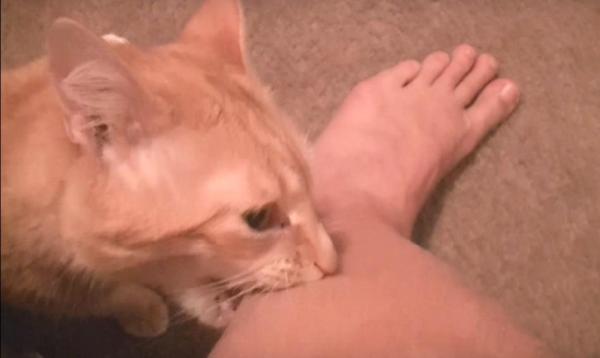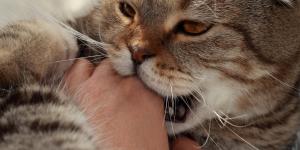My Cat Is Biting My Ankles



See files for Cats
A cat biting our ankles is a relatively common occurrence, partly because of their size. When we walk along the room and they are on the floor, our ankles are an easy target for them to attack. They don't usually cause much damage to the ankles themselves, but this behavior can be dangerous as it provides a tripping hazard. This can be particularly problematic for those of us with mobility issues. Although this explains why cats might nip at our ankles, it doesn't explain the underlying behavior behind this ankle aggression in cats.
At AnimalWised, we find out why my cat is biting my ankles. We look at the underlying reasons behind this behavior and how to stop cats biting our ankles again in the future.
Imagen: YouTube @Bad Cat Chris
Why does my cat bite my ankles?
Despite having been domesticated, cats maintain innate hunting instincts, as do all felines. Unlike their wild relatives, our pets don't often need to use their skills as such skilled hunters, since they do not need to catch prey to feed.
Domestication protects cats from numerous diseases and threats from the environment. At the same time, when due attention is not paid to the enrichment of the environment that a feline requires to be energetic and healthy, different behavioral problems appear. You may wonder why your cat attacks you for no reason, but this is not the case. These behaviors manifest for a reason.
As stated in the introduction, cats often bite our ankles because they are at their level. This not only means they can see our feet, but it also means they may find it difficult to distinguish them. To our cat, our feet might seem like two separate entities which move along the ground like they do, mimicking the movement of many prey animals. If we have a loose lace or wavy adornments on our shoe, this can make them even more enticing.
Causes of ankle biting in cats
If your cat is biting your ankle, their desire to do so as a specific impulse behind it. This could be due to:
- Boredom: most cats that bite the ankles of their guardians show some of the 5 symptoms of boredom in cats. By spending a lot of time alone and not having an enriched environment or not receiving enough attention from their tutors, a cat finds biting ankles the perfect opportunity to exercise their natural hunting instinct. If your cat spends a lot of time alone, they may get excited when they see you and bite you ankles as a way to interact.
- Poor diet: if your cat is not being properly fed, they will want to make it clear to you. Whether they are not getting enough food, their feeding routine is haphazard or if their food is of insufficient quality, it is common for them to communicate their needs in various ways. Some cats may become obsessed with food, others might bite your ankle to let you know something is wrong.
- Stress: there are many causes of stress in cats. Some can be due to problems in their youth such as poor socialization or even experiencing trauma. Others can be due to more recent issues such as changes in the home or the presence of threats. When a cat becomes stressed they can act out and may bite your ankles.
It may not be obvious, but when we play with our cats, we give them the opportunity to exercise their innate instincts. For example, fishing rod toys with feathers are popular because they mimic bird prey. If we stop playing with our cats or do not provide suitable cat toys and accessories for them to remain active during our absence, it is very likely they will find an escape valve for their boredom. This can include attacking our ankles.

Other reasons cats attack our ankles
Although biting ankles can mean our cat is bored and does not have the necessary toys to exercise their instincts positively without hurting their guardians, cats can also bite for different reasons. Depending on the circumstance, a cat may bite as a sign of:
- Social interaction
- Being over-excited
- Demonstration of affection
- Due to poor socialization
- Sign of fear or distrust
- They feel vulnerable
If a cat bites you gently when you feed them or play with them, they are probably showing you their love and gratitude. This is especially the case if your cat licks you first and then bites you. It is important not to reinforce this behavior and instead ignore it. This will teach your cat to express their affection in a safe and calm way, using positive reinforcement for cats to recognize only desirable attitudes. Remember that punishing, separating or scolding are also ways to reinforce behavior, as this is still a form of attention.
To prevent specific behavior, it must be ignored completely. Only in this way will the cat stop after realizing they won't receive a response from us. On the other hand, if a cat is sick or feels vulnerable in a certain context, they may bite as a form of self-defense, to avoid possible damage to their welfare.
If you notice your cat has symptoms of weakness, hides for a long time or is isolated, and biting as a form of defense, it is very important to go to the veterinarian immediately. Some diseases can cause changes in cat behavior as pain makes them feel more vulnerable.
As cats have an individual character, there is no exact interpretation for every sound, gesture or expression that felines use in their daily lives to express their feelings, desires and moods. Your cat is unique, so there is no previously established definition of their personality. To interpret the meaning of ankle biting and the various forms of feline expression, it is important you take your time to discover their character and understand their body language.
If you notice that your cat has become aggressive or is experiencing negative changes in their behavior, it is important to consult a veterinarian specializing in feline ethology. Together with this professional, you can figure out the cause of these alterations and establish a treatment based on specific guidelines.
How to prevent my cat from biting my ankles
Although we can understand that the act of jumping towards our ankles is instinctive and natural in our cats, the truth is that biting this sensitive region can be annoying and painful. It can be especially harmful if they are doing it to a vulnerable person who may trip during an attack. Below, we provide some practical tips to try and avoid these attacks in order to generate a healthier coexistence in your home.
- Environmental enrichment: you have to go out to work and fulfill your responsibilities. This means you will have to leave your cat alone at home. To avoid behavioral problems and symptoms of stress or boredom, such as attacking the ankles, it is essential to enrich their environment with toys, scratchers, shelves to climb, hiding places, and other accessories that allow your cat to remain physically and mentally stimulated during your absence.
- Quality time: it is fundamental that you reserve time exclusively to play and share quality moments with your cat. Even if you tired when you return home, remember to spend a few minutes with your animal. The strengthening of your bond will mean you will never regret it.
- Consider adopting another cat: if you think your cat is bored of playing alone and these episodes of boredom persist, you can consider giving him a companion. Remember to pay attention to your cat's temperament and analyze their sociability. If you consider the presence of another individual can improve the quality of life of your feline, remember to socialize them before suddenly imposing a coexistence presence into its life. Learn more with our article on introducing new cats to each other.
- Preventive medicine: as we have mentioned, some pathologies can cause stress and modify the behavior of your cat. To keep them healthy and balanced, it is essential to provide adequate preventive medicine throughout their lives. Remember to make periodic visits to the veterinarian every 6 months, respect their vaccination and deworming schedules. Also, offer your cat a healthy balanced diet and keep them physically and mentally stimulated.

My kitten keeps biting my ankles
Finally, we need to make an important distinction between adult cats and kittens biting ankles. While both are expressing innate hunting impulses, a kitten may have not yet had the chance to learn proper boundaries.
When kittens develop, they should spend time with their mother and siblings. During this time, their socialization period begins. Their mother provides important guidance by stopping them when they behave inappropriately. When it comes to biting, their siblings are just as important. Within a litter, the kittens will play and bite each other as a game. When the bite becomes too hard, the other kittens will let them know and the cat learns bite inhibition.
When a kitten is adopted into our home, they may have developed bite inhibition with their siblings, but they need to do it again with us. Kittens bite our ankles because they are low to the ground and our feet movement makes them appear similar to their natural prey. Not only are they honing their hunting skills, but they are learning the boundaries we have in our home.
For this reason, taking a kitten too early from their mother and siblings is dangerous. It negatively affects their socialization period and many do not learn bite inhibition. It is much easier for other cats to teach this, but we will have to do our best. Stopping a kitten from biting our ankles involves the factors mentioned above, but it also requires training.
We need to divert our attention away from the kitten when they try to bite us. Although we shouldn't scold them, we can say a firm no before walking away so they no this is not acceptable. When they play with us without biting, we can then use positive reinforcement to show them how they should behave.
Cats may also bite other cats if they have been poorly socialized. For this reason, we need to learn how to socialize cats with our cats correctly.

If you want to read similar articles to My Cat Is Biting My Ankles, we recommend you visit our Behavioral problems category.






 My cat is about 2-2 1/2 of age . I can be just standing there doing dishes, laundry, ect, an he will just bit me an hard an draw blood why? I don't pet him , I just mind my own buisness, he bits anyone when ever he wants . I throw him out side. Please help don't no what else to do
My cat is about 2-2 1/2 of age . I can be just standing there doing dishes, laundry, ect, an he will just bit me an hard an draw blood why? I don't pet him , I just mind my own buisness, he bits anyone when ever he wants . I throw him out side. Please help don't no what else to do



